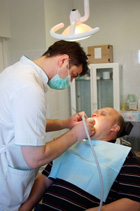 The two most common problems that affect the health of our teeth are tooth decay and gum disease. Tooth decay is when plaque acid has eroded the protective layer of enamel, exposing the more sensitive central part of the tooth to bacteria and infection. This can result in painful and unpleasant complications and expensive root canal and crown treatment. Most early decay is addressed by fillings, which most people will experience during their lifetime.
The two most common problems that affect the health of our teeth are tooth decay and gum disease. Tooth decay is when plaque acid has eroded the protective layer of enamel, exposing the more sensitive central part of the tooth to bacteria and infection. This can result in painful and unpleasant complications and expensive root canal and crown treatment. Most early decay is addressed by fillings, which most people will experience during their lifetime.
Gum disease is slightly less obviously a problem than tooth decay but with nearly all of us standing a good chance of having it at some point in out lives it is very worthwhile to recognise the signs and symptoms and know what to do about it. Gum disease in its mild form is called gingivitis and will usually involve a slight inflammation of the gum tissue. This can be quite sensitive but gingivitis is usually easily treated with improved dental hygiene and treatment from a City of Leeds dentist.
However, if the first signs of gingivitis are not picked up by you, and you are missing your six-monthly check ups with your dentist, the problem could become the more serious periodontitis. This is a much more serious form of gum disease that involves severe inflammation, bleeding of the gums and even recession of the gum tissue. Once gum tissue has been destroyed it will not grow back, so it is vital you receive the necessary treatment as soon as possible.
In some serious cases, periodontitis may involve the need for tissue removal, hospitalisation and even extraction. It will also be very painful and require continued treatment with antibiotics. You can prevent periodontits and all gum disease with improved cleaning and more regular visits to your dentist.





 Bad breath can be caused by a number of factors. A small percentage of cases are caused by digestion problems or other internal concerns but in nearly 90 per cent of cases, it is caused by problems occurring in the oral cavity. This could be the result of poor standards of oral hygiene. Food and bacteria that are trapped in small spaces between the teeth and in the grooves of the tongue will decay and release nasty smelling sulphurous compounds, which are then expelled on the breath. This kind of bad breath can be masked by using oral products, but only temporarily. The only sure-fire cure for this kind of bad breath is to make dramatic improvements in your daily oral hygiene routine and ensure you are brushing and flossing correctly.
Bad breath can be caused by a number of factors. A small percentage of cases are caused by digestion problems or other internal concerns but in nearly 90 per cent of cases, it is caused by problems occurring in the oral cavity. This could be the result of poor standards of oral hygiene. Food and bacteria that are trapped in small spaces between the teeth and in the grooves of the tongue will decay and release nasty smelling sulphurous compounds, which are then expelled on the breath. This kind of bad breath can be masked by using oral products, but only temporarily. The only sure-fire cure for this kind of bad breath is to make dramatic improvements in your daily oral hygiene routine and ensure you are brushing and flossing correctly. Many people think that gum disease is only a problem that affects adults but studies reveal that nearly half of all children have gingivitis, the milder form of gum disease. Although it is true that cases of periodontal disease (the more serious form of gum disease) are more common among adults, it still can occur in children.
Many people think that gum disease is only a problem that affects adults but studies reveal that nearly half of all children have gingivitis, the milder form of gum disease. Although it is true that cases of periodontal disease (the more serious form of gum disease) are more common among adults, it still can occur in children. There are over 350 types of bacteria found in the average human mouth but many of these have no real harmful effects. However, about 5 per cent of these bacteria are responsible for causing gum disease if not removed by brushing and flossing.
There are over 350 types of bacteria found in the average human mouth but many of these have no real harmful effects. However, about 5 per cent of these bacteria are responsible for causing gum disease if not removed by brushing and flossing. Gum disease is the infection of the gingival tissue that surrounds and supports teeth and occurs in two stages called gingivitis and periodontitis.
Gum disease is the infection of the gingival tissue that surrounds and supports teeth and occurs in two stages called gingivitis and periodontitis. Gum disease, or gingivitis as it is also known, can be caused when bacteria is allowed to build up in the mouth which causes the gums to become infected. This usually manifests itself in painful, irritating and swollen gums that if left untreated it can become periodontitis and lead to wider infection and tooth loss.
Gum disease, or gingivitis as it is also known, can be caused when bacteria is allowed to build up in the mouth which causes the gums to become infected. This usually manifests itself in painful, irritating and swollen gums that if left untreated it can become periodontitis and lead to wider infection and tooth loss.

